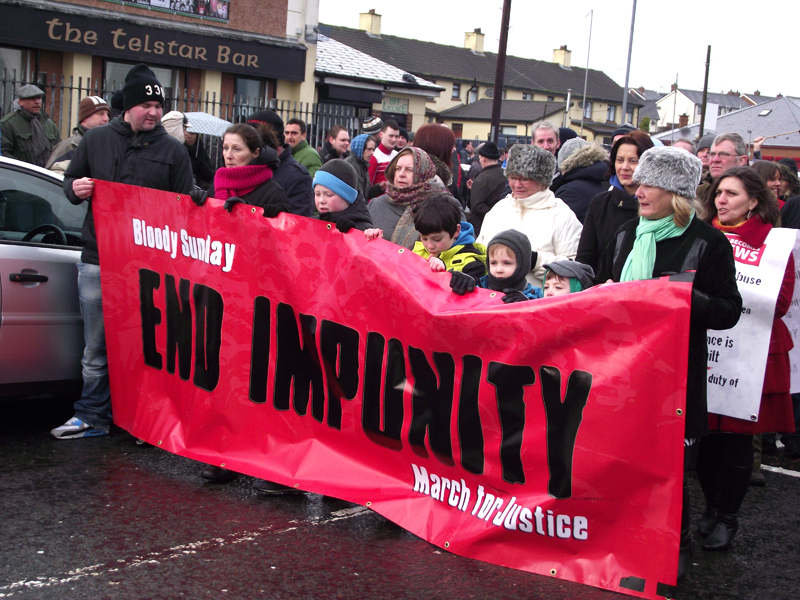
‘It is the message from the working class families of Bloody Sunday, the Miners Strike and Hillsborough:
‘Why develop such an elaborate mechanism of cover-up if not anticipating using it in the future…’!’
FRFI Supporters have continued to stand with the campaigning relatives and supporters of those 14 people murdered by the Parachute regiment on the streets of Derry, Ireland on Sunday 30 January 1972. Thousands marched again this year on the original route of the 1972 Civil Rights march which was brutally attacked by the British army as it reached the Bogside 41 years ago.
This year the Bloody Sunday Commemorative Programme of events brought together speakers from the Miners Strike of 1984- 85 and the Hillsborough Justice Campaign. Dave Douglass of the National Union of Miners reminded participants of the scale of the industrial battle and the national police operation mounted to defeat the miners and their allies: 144,228 miners remained on strike for a year, 9,000 were arrested, there were 10,000 charges and 200 jail sentences, 20,000 miners were hospitalised and 80,000 jobs were lost. Fight Racism! Fight Imperialism! spoke of the significance of the open handshake between Liam McCluskey, an ex- Irish Prisoner of War and the National Union of Miners’ Malcolm Pitt who had been sentenced to 7 years as a result of the Miners Strike. This demonstration of the need for common cause between the Irish people and the working class of Britain took place at a conference held in 1984 entitled ‘Building an Irish Solidarity Movement’ sponsored by FRFI/RCG. That movement remains to be built.
Jenny Hicks lost two daughters at the disaster at the Hillsborough Football Stadium in 1989, where 96 people died due to police incompetence and indifference. Police contempt for working class people was evident on the day itself but was magnified over and over again in the organised cover-ups after the deaths. The relatives campaign for justice has recently won a victory in the overturning of the cover-up inquest findings of ‘accidental death’ in 1990. index.php/britain/2728-a-catalogue-of-lies.
It was recognised by the miners and Hillsborough campaigners that the cover-up operations deployed to exonerate the guilty and condemn the innocent were presided over by the same Prime Minister- Margaret Thatcher- and the same Chief Constable and South Yorkshire Police Force. Relatives of those killed on Bloody Sunday have vast and painful experience of the murderous capacity of the British ruling class but what they shared was recognised by all. That the deeds in themselves were injustices but this was compounded by the state directed cover-up operation put into action within minutes of the crimes. In one sense this was the greater crime as relatives had to witness the victims maligned and then they themselves were subject to pressure and abuse. The Bloody Sunday relatives and their supporters spoke of the recent demonisation of those who had insisted that despite David Cameron’s apology and acceptance of the innocence of most of the murdered, that justice still needed to be done. The Police Service of Northern Ireland has begun a criminal investigation but has not yet interviewed a single British soldier. Sinn Fein’s call in 2010 to stop marching has done something the British were never able to do- divide the Bloody Sunday families. Those who continue to campaign rejected the characterisation that they were psychologically marooned in the past, cripplingly unable to move on, stuck in grief. This attack is another weapon in the British state’s cover-up toolkit: along with media manipulation, evidence tampering and delay.
At the final panel discussions entitled ‘Cover-up’ and ‘End Impunity’, solicitor Gareth Peirce, who has represented framed up miners and Irish people, spoke of the present campaign of the Kenyan people tortured and abused by Britain and why the call to end impunity for these crimes matters so much. In her argument for this she pointed out that as the state and its agents have nothing to fear from the crimes they commit they will continue to carry them out. The soldiers who murdered on Bloody Sunday knew they would not face justice. Danial Holder, Deputy Director of the Campaign for the Administration of Justice, chillingly reviewed how Britain’s rule in Ireland was so far from internationally accepted legal norms. He knew of no model of accountability in the world like that the British had constructed about the Bloody Sunday Inquiry with the novel ‘Review and apologise’ arrangement. He convincingly detailed how powerless was legal process when faced with counter- insurgency policing, re- branded since 1981 as ‘intelligence led policing’, stating that ‘it is impossible to say if MI5 are operating within the law’. The system of cover-up has actually been, legalised, modernised and strengthened to withstand the demands of campaigners for an end to impunity and for legal accountability. Mr Holder made a final, vital, point. It is the message from the working class families of Bloody Sunday, the Miners Strike and Hillsborough: ‘Why develop such an elaborate mechanism of cover-up if not anticipating using it in the future…’! His warning was echoed by Bernadette McAliskey when she spoke at Free Derry Corner after the march, that the British state’s historical circumvention of legality could not be challenged by the ‘collaborators’ who were now in government. Interment without trial, the ending of which was an original demand of the march in 1972, was still in place and responsible for the continuing illegal imprisonment of Marion Price and others. The previous day the Stormont Minister of Justice had been condemned by a senior judge for his refusal to grant compassionate parole for Marion Price to mourn the death of her sister Delours with her family. Looking about the Bogside where, as Bernadette Devlin, she had addressed the crowds on the day of the massacre in 1972, she called for a stepping up of campaigning and political organisation to challenge unemployment, poor housing and attacks on welfare -and to be prepared to face again the brutality of the British state in doing so.
Michael MacGregor




